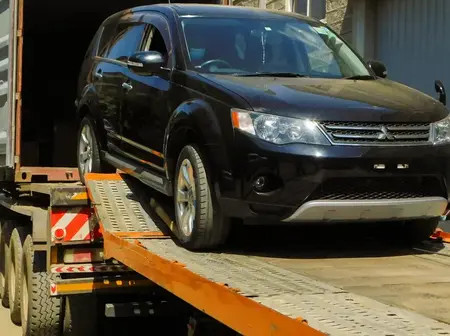Kenyans can bring in a car without paying the usual import taxes, but only if they fall into strict exemption categories and follow the process to the letter.
The Kenya Revenue Authority (KRA) recognises three broad groups for motor-vehicle tax relief: Persons with disabilities (PWDs), returning residents, and diplomats/first arrivals.
Below is a clear guide to eligibility, conditions, and the steps to take.
Before you start: the car itself must qualify
All vehicles, whether exempt or not, must meet Kenya Bureau of Standards (KEBS) rules under KS 1515:2000.
The car must be right-hand drive, it must be less than eight years from its year of first registration, and it needs a pre-shipment roadworthiness inspection by a KEBS-appointed agent in the export country.
Ordinarily, importing a car attracts Import Duty, Excise Duty, VAT, plus Import Declaration Fee (IDF) and Railway Development Levy (RDL).
KRA lists IDF at 3.5% and RDL at 2%. Rates for duty and excise vary by policy and vehicle type.
Exemption means some or all of these charges are lifted for eligible people, but not always all of them.
According to the Kenya Revenue Authority, persons with disabilities who are duly registered may apply to KRA Customs to import one motor vehicle duty-free for personal use.
The exemption is limited to a single vehicle at any given time and cannot be used for commercial purposes.
A replacement is allowed once every four years, but only after the original exempt vehicle has been properly disposed of and any taxes due on it in Kenya have been settled.
As part of the clearance process, Customs may also require a supervised test drive or assessment, particularly where the vehicle has been modified to suit the user, at the designated point of entry.
What KRA asks for (core items)
Application letter to the Commissioner, Customs & Border Control.
Medical certificate from a registered doctor.
Recommendation from the Association for the Physically Disabled of Kenya or the National Council for Persons with Disabilities (NCPWD)
Driving licence (Class H/F); for certain disabilities, KRA may assess the use of a nominated driver per case.
Bill of lading, invoice/pro-forma, proof of payment (bank statements/remittance slips).
KRA PIN/Tax Compliance/Exemption certificate, National ID, NCPWD card.
File the exemption request with KRA Customs (exemptions are lodged at the Customs Registry, 11th floor, Times Tower).
Work through a licensed clearing agent to upload documents and arrange the physical inspection at entry.
Kenyans relocating permanently to Kenya after living abroad, who owned and used the vehicle for at least 12 months before returning.
KRA exempts Import Duty, Excise Duty, VAT and IDF on one vehicle that meets the conditions. RDL is still payable. Other port/agency charges may also apply.
Strict conditions and limits
One vehicle only for personal use (no commercial vehicles).
Vehicle must be shipped within 90 days of your arrival (KRA may extend up to 360 days on request).
Vehicle must be under eight years (KEBS rule) and RHD.
Buses/minibuses over 13 seats and load carriers above 2 tonnes are excluded.
If you’re coming from a left-hand-drive country, you can import a replacement RHD car.
The RHD car’s CRSP (KRA value) must not exceed the LHD vehicle you owned and used abroad.
2025-06-28T11:18:12+00:00
2025-09-03T14:32:11+00:00
Passport with entry/exit stamps and proof of residence abroad.
Evidence of ownership & use for more than 12 months (foreign logbook/registration, insurance, etc.).
Import documents (invoice, bill of lading/airway bill, packing list).
Interpol clearance (as directed). Submit through your clearing agent in KRA’s iCMS.
Under KRA rules, eligibility covers accredited diplomats and staff of foreign missions, United Nations bodies, and specialised agencies.
It also extends to “first arrivals” who are coming to Kenya to take up a post on a contract of at least two years.
What’s exempt?One motor vehicle plus household/personal effects, cleared within 90 days of first arrival (extendable up to 360 days on approval).
Eligible applicants in this category can have all major taxes, including Import Duty, Excise Duty, VAT, the Import Declaration Fee (IDF), and the Railway Development Levy (RDL), waived under the law.
To claim the waiver, you must present a PRO-1B authorisation from the Ministry of Foreign Affairs and proof of your diplomatic status or qualifying contract.
If you later sell, transfer, or dispose of the duty-free vehicle, the applicable taxes will become payable.
Even when you qualify for an exemption, you still file a normal import entry. Typical documents include:
Commercial invoice, original cancelled foreign logbook, bill of lading, and KEBS pre-shipment inspection certificate.KRA PIN (and, for companies, certificate of incorporation). Your agent will use these to clear the car and activate the exemption.
Confirm the car complies with KEBS (Should be right-hand drive and not older than 8 years) and get a pre-shipment inspection in the export country.
Check your category (PWD, returning resident, diplomat/first arrival) and gather the specific evidence listed above.
Appoint a licensed clearing agent to lodge your entry in KRA’s system and submit the exemption at KRA Customs (Customs Registry, 11th floor).
Present the vehicle for inspection and, where required (e.g., PWD), a test drive/assessment with Customs.
Pay any non-exempt charges (e.g., RDL for returning residents, port/storage fees) and collect your release for NTSA logbook issuance.
2025-06-28T11:18:12+00:00
2025-09-03T14:32:11+00:00
One car at a time under exemption. Trying to stack benefits (e.g., PWD and returning resident) on two vehicles is not allowed.
Timelines matter: Missing the 90-day window (without extension) can void the privilege.
Rules change: Tax rates and procedures are updated periodically. Always verify against KRA’s latest guidance or consult a licensed agent before you buy/ship.
If you’re a PWD, a Kenyan moving home, or a diplomat/first arrival, Kenya does allow tax-free import of one qualifying vehicle, but only if the car passes KEBS rules and you meet KRA’s evidence and timing tests.
If done correctly, you can legally save a substantial amount at the port.

Leave a Reply